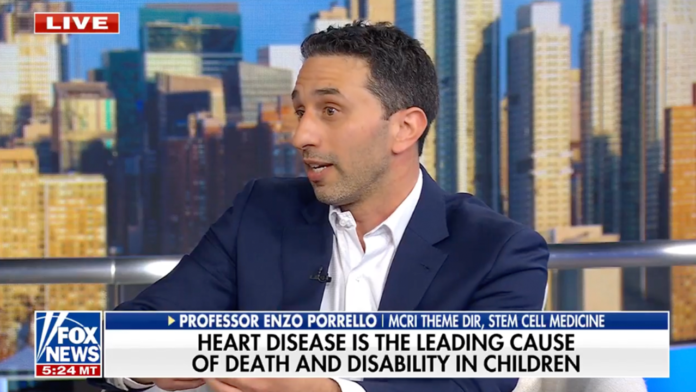Childhood heart disease is the leading cause of infant mortality and heart problems are the most common birth defects for infants, but new research indicates stem cells could be key in treating heart conditions.
Murdoch Children’s Research Institute (MCRI) Theme Director of Stem Cell Medicine Professor Enzo Porrello joined Fox & Friends on Wednesday to discuss the stem cell research he and his team have conducted to try and identify the causes of congenital heart disease.
“We’re one of the top three child health institutes in the world and our stem cell research is really renowned for being able to generate a number of different human cell types and tissues from stem cells,” Porrello said. “In my own research at MCRI, over the last ten years, has really focused on the development of miniature human heart tissues, which we can grow in the lab and these are mini beating heart tissues.”
“We can now grow these miniature human heart tissues from any individual,” he added. “This is an incredibly powerful technology because it allows us to grow these tissues from children with heart disease, and we can use those models to understand the causes of the heart disease and to develop potential treatments.”
BOY FACING BLINDNESS GETS LIFE-CHANGING EYE SURGERY: ‘SUCH A BLESSING’
Porrello said that through his research, he would like to pinpoint the underlying genetic causes of heart disease in a patient or family.
“We often simply don’t have the answers and this is really where more research is needed and why we need to do the type of research that we’re doing to really understand what causes childhood heart disease, so that we can provide those kinds of answers to patients and families.”
Murdoch Children’s Research Institute (MCRI) Theme Director of Stem Cell Medicine Professor Enzo Porrello joined Fox & Friends on Wednesday to discuss the stem cell research he and his team have conducted to try and identify the causes of congenital heart disease. (Fox News)
He also explained that a heart transplant is often the last resort for a patient, but fortunately, heart failure is quite rare in children.
“This is when the heart can no longer pump blood efficiently around the body,” Porrello said. “We don’t have any therapies that can really target the underlying root cause of heart disease, that can prevent heart failure or that can restore function to the failing heart.”
“Our existing drugs really only help to alleviate symptoms and slow down disease progression, but eventually the heart needs to be transplanted and this is really a last resort therapy,” he said.
STUDY SHOWING PUBERTY BLOCKERS DO NOT IMPROVE KIDS’ MENTAL HEALTH NOT PUBLISHED FOR FEAR OF BEING ‘WEAPONIZED’
Through the technology he has developed at MCRI, Porrello said he and other researchers can take a blood sample or a skin sample from any individual, that then gets reprogrammed in the lab back to a stem cell that can be used as a different cell type in the body, like beating heart tissue, for example.
Porrello said his work was inspired by two of his cousins, Peter and Frankie, who were born with a heart defect. Sadly, Frankie passed away at the age of nine.
“We often study families that will have heart disease running in the family, and that can often guide us towards an underlying cause,” Porrello said. “Then, what we’re really working towards is trying to develop treatments that can really target that root cause of heart disease and that might prevent that progression to failure and avoid the need for transplantation.”
“I think we’re at an incredibly exciting time in medicine and biotechnology right now,” he concluded. We’re seeing technologies moving at a pace that we really, I think, haven’t seen before … I’m hopeful, based on how far things have come over the last ten years, about the next next decade. It’s going to be really exciting.”






